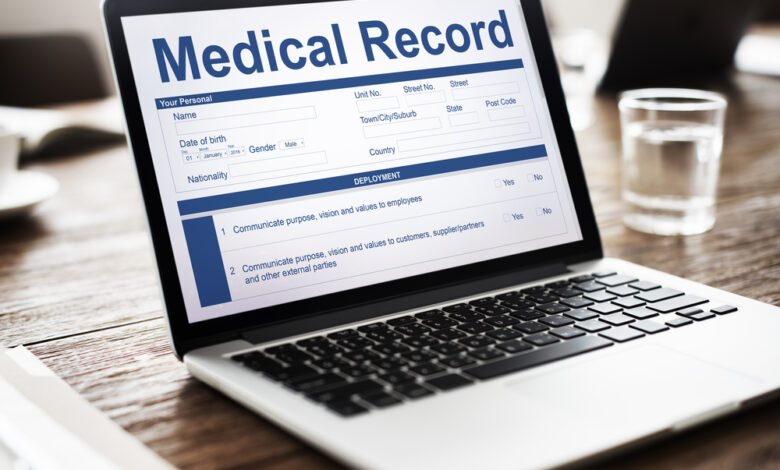Blockchain In Health Records Hype Or Game-Changer?

Blockchain in Health Records: Hype or Game-Changer? sets the stage for this enthralling narrative, offering readers a glimpse into a story that is rich in detail and brimming with originality from the outset. As healthcare continues to evolve, the integration of blockchain technology into health records management presents a unique opportunity to address long-standing issues such as data security, patient privacy, and interoperability among systems. While the promise of blockchain is undeniable, its real-world application raises questions about feasibility and effectiveness, making it a topic worth exploring.
Introduction to Blockchain Technology in Health Records
Blockchain technology, known for its decentralized and immutable nature, is increasingly recognized as a transformative force in various sectors, including healthcare. At its core, blockchain is a distributed ledger that securely records transactions across a network of computers, ensuring transparency and reducing the risk of fraud. In health records management, this technology offers a promising solution to several longstanding issues, such as data security, interoperability, and patient control over personal health information.
Incorporating blockchain into health record management systems can streamline processes and enhance data integrity by allowing secure sharing of patient records among healthcare providers. The potential benefits include improved patient outcomes through better data exchange, decreased administrative costs by reducing paperwork and errors, and increased patient engagement by giving individuals access to and control over their health data. With these advantages, blockchain has the potential to revolutionize how health records are maintained and used.
Potential Benefits of Blockchain in Health Records
The integration of blockchain technology in health records presents several key advantages that can significantly improve healthcare delivery. These include:
- Enhanced Security: Blockchain’s cryptographic security measures ensure that health records are protected from unauthorized access and tampering. Each transaction is encrypted, making it nearly impossible for hackers to alter data without detection.
- Interoperability: With a standardized blockchain framework, different healthcare providers can share and access patient records seamlessly, breaking down silos that have traditionally hindered data sharing.
- Patient Empowerment: Individuals can have greater control over their own health information, choosing who can access their data and for what purpose, leading to a more personalized healthcare experience.
- Cost Reduction: By eliminating redundancies and improving efficiency in record-keeping, blockchain can help reduce administrative costs associated with managing health records.
- Auditability: The immutable nature of blockchain provides a complete and transparent audit trail for all transactions related to health records, ensuring accountability and trust among stakeholders.
Challenges of Adopting Blockchain in Healthcare
Despite the promising benefits, the adoption of blockchain technology in healthcare faces significant barriers that need to be addressed. These challenges include:
- Regulatory Hurdles: The healthcare sector is heavily regulated, and the introduction of blockchain technology raises questions about compliance with existing laws and regulations regarding patient data privacy and security.
- Integration with Legacy Systems: Many healthcare providers operate on outdated systems that may not easily integrate with blockchain solutions, necessitating substantial investments in technology upgrades.
- Scalability Issues: As the number of transactions increases, ensuring that blockchain solutions can scale effectively without compromising performance remains a critical concern.
- Cost of Implementation: Initial costs associated with deploying blockchain technology, including infrastructure and training, can be a barrier for many healthcare organizations.
- Industry Resistance: Resistance to change is common in the healthcare industry, and convincing stakeholders to embrace a new technology can be challenging.
Current Status of Health Records Management
The management of health records has evolved significantly over the years, yet many traditional methods still persist in various healthcare facilities. Despite advancements in technology, these conventional practices face notable limitations that affect efficiency and patient care. The integration of electronic health record (EHR) systems has made strides towards modernization, yet they too come with challenges that blockchain technology could potentially address.
Traditional methods of health records management primarily rely on paper-based systems. These systems are not only labor-intensive but also prone to errors and mismanagement. Key limitations of paper-based records include:
- Accessibility Issues: Retrieving records can be time-consuming, especially if they are stored off-site or in multiple locations.
- Data Security Risks: Physical documents can be lost, stolen, or damaged, leading to significant data breaches.
- Difficulty in Data Sharing: Sharing patient information across different healthcare providers is cumbersome, often requiring faxing or mailing documents.
- Compliance Challenges: Maintaining compliance with health regulations such as HIPAA can be difficult with paper records, resulting in potential legal repercussions.
In contrast, current EHR systems aim to overcome these barriers by digitizing health records. However, they still face several limitations, which may be addressed by blockchain solutions. EHRs provide enhanced accessibility and data sharing capabilities; however, they often struggle with interoperability among different platforms. Notably, many EHR systems use proprietary formats, making it challenging for different software to communicate seamlessly. This can lead to data silos, whereby crucial patient information is isolated within a single system.
Statistics highlight the widespread adoption of EHRs within healthcare organizations. As of 2021, approximately 85% of office-based physicians in the United States utilized EHR systems, illustrating a significant shift from traditional methods. Despite this, a report from the Office of the National Coordinator for Health Information Technology indicated that only about 64% of hospitals reported using a certified EHR system that met meaningful use criteria, showing that while adoption is high, full compliance and effective usage remain areas for improvement.
In summary, while traditional health records management techniques face numerous limitations, the advent of EHR systems has ushered in a new era of digital record-keeping, albeit with its own set of challenges. The potential for blockchain technology to enhance health records management continues to garner interest, promising a more secure, interoperable, and efficient solution for the future of healthcare.
Advantages of Blockchain in Health Records
Blockchain technology offers a revolutionary approach to managing health records, addressing significant concerns around data security, interoperability, and patient privacy. This technology, characterized by its decentralized and immutable nature, promises to enhance the way health information is stored, accessed, and shared. As healthcare continues to evolve, understanding the advantages of blockchain becomes crucial for stakeholders aiming to improve patient care and operational efficiency.
Enhanced Data Security and Patient Privacy
One of the primary advantages of blockchain in health records management is its ability to significantly enhance data security and safeguard patient privacy. The decentralized nature of blockchain means that patient data is not stored in a single location, reducing the risk of unauthorized access and data breaches. Each transaction on the blockchain is encrypted and linked to the previous transaction, creating a secure chain of custody for health information.
A key aspect of patient privacy is ensuring that individuals have control over their own health information. With blockchain, patients can grant and revoke access to their records selectively, enhancing their autonomy over personal data.
“Blockchain provides a robust framework for ensuring that only authorized individuals can access sensitive health information.”
Furthermore, the transparency of blockchain allows for an auditable trail of who accessed the records and when, assisting in compliance with regulations like HIPAA (Health Insurance Portability and Accountability Act).
Improved Interoperability Among Healthcare Systems, Blockchain in Health Records: Hype or Game-Changer?
Interoperability—the ability of different healthcare systems to communicate and share information—is a longstanding challenge in health records management. Blockchain can facilitate improved interoperability by providing a common platform for data exchange across various systems. This allows for seamless sharing of patient information, which is critical for coordinated care and better patient outcomes.
The use of standardized blockchain protocols can enable different healthcare providers to access and update patient records in real-time, leading to more informed clinical decisions.
For instance, the initiative by Estonia to use blockchain for its e-health system demonstrates the potential for interoperability. In this system, patient data is securely stored on a blockchain, accessible by different healthcare providers, ensuring that all parties are working with the most current information.
Successful Blockchain Applications in Health Record Management
Several healthcare organizations have already begun to implement blockchain technology in their operations, showcasing its viability and benefits. Notable examples include:
- MedRec: Developed by researchers at MIT, MedRec is a decentralized health record management system that utilizes blockchain to provide patients and providers with secure access to medical data while maintaining patient privacy.
- Guardtime: This Estonian company has implemented blockchain technology in the country’s healthcare system, ensuring the integrity and privacy of health records while allowing interoperability among different healthcare institutions.
- Factom: Factom uses blockchain to enhance the security and accessibility of health data, enabling clinicians to verify patient records securely and efficiently, thus improving patient care.
These examples demonstrate that blockchain technology is not merely a concept; it is actively being used to enhance health records management and has the potential to transform the healthcare landscape.
Challenges and Limitations of Blockchain Implementation
Implementing blockchain technology in health records comes with a range of challenges and limitations that organizations must navigate. These hurdles can hinder the potential benefits that blockchain could bring to healthcare, including improved data security, interoperability, and patient control over personal health information. Understanding these challenges is crucial for healthcare organizations considering blockchain adoption.
Regulatory Hurdles
Healthcare organizations face significant regulatory hurdles when implementing blockchain technology. The complex landscape of healthcare regulations, such as HIPAA in the United States, poses challenges regarding patient privacy, data sharing, and consent management. Blockchain’s decentralized nature can complicate compliance with these regulations, as it can be unclear how to manage data ownership and access rights. The following key points illustrate the regulatory challenges:
- Compliance with data protection laws is essential, requiring organizations to ensure that personal health information is appropriately protected and that all transactions comply with existing regulations.
- Interoperability standards must be addressed to ensure that blockchain solutions can seamlessly integrate with existing healthcare systems and comply with regulatory frameworks.
- Legal interpretations of data ownership and liability in a decentralized environment remain ambiguous, creating uncertainty for organizations looking to adopt blockchain technologies.
Technological Barriers
Technological barriers present another significant challenge to blockchain adoption in healthcare. Scalability and integration issues can impede the successful implementation of blockchain systems. The healthcare sector manages vast amounts of data, and the following factors are critical to understanding these technological barriers:
- Scalability concerns arise as most blockchain platforms are currently not equipped to handle the large volume of transactions needed for widespread healthcare applications. This can lead to performance issues and delays in data processing.
- Integration with existing healthcare systems poses a challenge, as many legacy systems may not be compatible with blockchain technology, requiring extensive modifications or replacements.
- Interoperability among different blockchain networks is a concern, as varying standards and protocols can hinder data exchange between organizations, limiting the effectiveness of the technology.
Cost Implications
Transitioning to a blockchain-based health record system involves significant cost implications that healthcare organizations must carefully consider. While blockchain can offer long-term savings and efficiencies, the initial investment can be substantial. Key cost factors include:
- Development and implementation costs can be high, particularly for organizations that need to develop custom blockchain solutions tailored to their specific needs.
- Training and education costs for staff to understand and effectively use blockchain systems can add to the financial burden, requiring ongoing investment in workforce development.
- Ongoing maintenance and upgrades of blockchain systems may incur additional expenses, as technology continues to evolve and organizations must keep pace with new developments.
“Organizations must weigh the initial costs against potential long-term benefits to determine the viability of transitioning to blockchain technology.”
Case Studies of Blockchain in Healthcare
The application of blockchain technology in healthcare has yielded numerous innovative case studies, showcasing its potential to revolutionize health records management. These case studies provide critical insights into the real-world effectiveness of blockchain solutions compared to traditional record-keeping systems. By examining specific instances, we can discern the advantages and challenges faced in the implementation of blockchain technology in healthcare settings.
MedRec: A Patient-Centric Blockchain Solution
MedRec, developed by MIT Media Lab, serves as a pioneering example of how blockchain can be utilized in health records management. This decentralized platform enables patients to control their own medical records, while allowing healthcare providers to access and share pertinent data securely.
The system achieves interoperability among various health information systems, which is a significant hurdle in traditional health records management. Unlike conventional methods that often lead to fragmented data across institutions, MedRec streamlines the sharing of information, ensuring that all stakeholders have access to the most up-to-date records.
Key outcomes from the MedRec case study include:
- Enhanced patient autonomy: Patients have greater control over who accesses their medical data.
- Improved data accuracy: Real-time updates help reduce errors associated with outdated information.
- Increased security: The immutable nature of blockchain enhances the security of patient records against unauthorized access.
Healthcare professionals involved in the MedRec project report significant improvements in patient engagement and satisfaction, as patients feel more in control of their health information.
Guardtime: Securing Health Data in Estonia
Guardtime has implemented a blockchain-based system to secure health data in Estonia, a country known for its advanced digital infrastructure. The project focuses on ensuring the integrity and authenticity of health records through cryptographic verification methods.
This initiative addresses concerns related to data breaches and unauthorized alterations, which are prevalent in conventional health record systems. By leveraging blockchain’s decentralized architecture, Guardtime provides a transparent audit trail that stakeholders can trust.
The results of the Guardtime case study highlight several advantages:
- Reduction in fraud: The system helps detect and prevent fraudulent activities related to health records.
- Streamlined processes: Digital signatures and timestamps reduce administrative burdens associated with record verification.
- Easy access for patients and providers: The system allows seamless access to health data while maintaining strict security protocols.
Insights from Estonian healthcare professionals emphasize the importance of security and transparency in health data management, with many noting improved collaboration among healthcare providers.
Chronicled: Supply Chain Integrity and Patient Records
Chronicled focuses on leveraging blockchain to enhance the integrity of the pharmaceutical supply chain and linking it to patient records. This innovative approach allows for the tracking of medications from manufacturers to patients, ensuring authenticity and compliance with regulations.
By integrating supply chain data with patient records, Chronicled addresses the critical issue of counterfeit medications—a significant challenge for traditional health systems. This dual approach not only protects patients but also provides healthcare providers with reliable data on medication provenance.
Outcomes observed in this case study include:
- Enhanced patient safety: Patients receive authentic medications, reducing the risk of adverse effects from counterfeit drugs.
- Increased transparency: Stakeholders have access to a comprehensive view of the supply chain, fostering trust.
- Efficient recall processes: Rapid identification of affected products during recalls improves response times and patient safety.
Healthcare professionals participating in the Chronicled project highlight the importance of integrating supply chain management with health records, emphasizing that this holistic approach leads to better patient outcomes.
Future Prospects for Blockchain in Health Records
The future of blockchain technology in health records management is promising, with significant potential to enhance the efficiency, security, and interoperability of health data. As healthcare systems around the world grapple with challenges like data silos, security breaches, and patient consent management, blockchain offers innovative solutions that could transform how health records are maintained and accessed. Advancements in technology and shifting healthcare trends are paving the way for greater adoption and integration of blockchain solutions.
Potential Developments in Blockchain Technology
Looking ahead, several developments in blockchain technology could significantly impact health records management. These advancements include:
– Interoperability Solutions: Future iterations of blockchain may focus on creating seamless interoperability between various health information systems. This would enable data to be shared securely across different platforms without compromising patient confidentiality.
– Smart Contracts: The use of smart contracts can automate consent management for patients, allowing them to control who accesses their data and under what conditions. Such automation can reduce administrative burdens on healthcare providers and enhance patient trust.
– Enhanced Security Protocols: Innovations in cryptographic techniques may bolster the security of blockchain networks, making them more resilient against hacking and unauthorized access, thereby safeguarding sensitive health information.
– Integration with IoT Devices: As the Internet of Things (IoT) proliferates in healthcare, integrating blockchain with IoT devices could provide real-time data management and improve patient monitoring systems, enhancing both clinical care and research capabilities.
Trends Influencing Blockchain Adoption
Several key trends in healthcare are likely to drive the adoption of blockchain solutions in health records management:
– Patient-Centric Care: The shift toward patient-centered care emphasizes the importance of empowering patients with greater control over their health data. Blockchain aligns with this trend by providing patients with secure ownership and access to their records.
– Regulatory Support: Governments and regulatory bodies are increasingly recognizing the potential of blockchain in healthcare, leading to supportive frameworks that encourage its adoption. Policies that prioritize data security and interoperability can catalyze blockchain integration.
– Data Privacy Concerns: With rising concerns over data privacy and security among patients, healthcare providers are more inclined to explore blockchain as a solution that offers enhanced protection against breaches and unauthorized access.
– Increased Investment in Digital Health: The growing influx of investment in digital health technologies is likely to stimulate research and development of blockchain applications, leading to more robust solutions tailored for health records management.
Roadmap for Blockchain Integration
A strategic roadmap for the integration of blockchain into existing health record systems involves several key steps:
1. Assessment of Current Systems: Begin with a thorough evaluation of existing health record systems to identify gaps and areas that could benefit from blockchain integration.
2. Stakeholder Engagement: Involve all relevant stakeholders—including patients, providers, and payers—early in the process to gather insights and foster collaboration.
3. Pilot Projects: Launch pilot programs to test the feasibility and effectiveness of blockchain solutions in specific areas, such as secure patient data exchange or consent management.
4. Standardization Initiatives: Collaborate with industry groups to establish standards for blockchain implementation in healthcare, ensuring interoperability and compatibility with existing systems.
5. Education and Training: Provide education and training for healthcare professionals on blockchain technology, its benefits, and its implementation to ensure smooth adoption.
6. Continuous Improvement: Monitor and evaluate the impact of blockchain solutions regularly, using feedback to refine and improve implementations over time.
By following this roadmap, healthcare organizations can effectively integrate blockchain technology into their health records management systems, positioning themselves to harness its full potential in the future.
Ethical Considerations and Patient Perspectives
Incorporating blockchain technology into health records management brings forth a myriad of ethical considerations that merit exploration. As we delve into the intersections of technology and patient data, it becomes essential to analyze the implications on privacy, data ownership, and patient empowerment. This examination provides insight into how blockchain not only reshapes data management but also the ethical landscape surrounding patient information.
Ethical Implications of Blockchain in Patient Data Management
The deployment of blockchain technology in managing patient health records raises significant ethical questions surrounding consent, privacy, and data security. The decentralized nature of blockchain means that patient data can be securely shared among various healthcare providers without a central point of control. However, this raises concerns about informed consent and the extent to which patients understand and agree to the sharing of their data.
Key ethical implications include:
- Informed Consent: Patients must have a clear understanding of how their data will be used and shared. Blockchain emphasizes transparency, but patients need to be educated on the nuances of this technology.
- Data Ownership: Blockchain can redefine patient ownership of their health data, allowing individuals to control access and permissions. This shift challenges traditional notions of data stewardship held by healthcare institutions.
- Privacy Concerns: While blockchain provides enhanced security features, there is still a risk of unauthorized access or data breaches. Patients must trust that their sensitive information will remain confidential.
Patient Perspectives on Privacy and Data Ownership
Understanding patient perspectives is crucial in the discourse surrounding blockchain and health records. Many patients express a desire for greater control over their health information. Surveys indicate that a significant percentage of individuals are concerned about the privacy of their medical data and want to be active participants in managing it.
Key insights from patient perspectives include:
- Control Over Data: Patients increasingly favor systems that allow them to decide who accesses their data, fostering a sense of ownership and involvement in their healthcare.
- Trust in Technology: While patients appreciate the potential of blockchain for securing their data, there remains skepticism about the technology’s complexity and the ability of healthcare providers to implement it effectively.
- Awareness and Education: Many patients feel uninformed about blockchain technology, highlighting the need for healthcare organizations to provide educational resources that demystify the technology.
Empowering Patients through Blockchain Technology
Blockchain technology holds the potential to empower patients significantly in managing their health information. By facilitating direct access to their health records, patients can make informed decisions regarding their care. With blockchain, patients can maintain a comprehensive and portable health history, accessible anywhere and anytime.
Examples of empowerment through blockchain include:
- Personal Health Records (PHR): Patients can store their medical history, lab results, and treatment plans on a blockchain, ensuring that they have continuous access to their health information.
- Decentralized Identity: Patients can control their identity and credentials on the blockchain, which can streamline processes such as medication prescriptions and referrals, reducing administrative burdens.
- Participation in Research: With consent and control over their data, patients can opt to share their health information for research purposes, contributing to the advancement of medical science while retaining privacy.
“Blockchain technology not only enhances security but also grants patients the autonomy they seek in managing their health information.”
Ending Remarks
In conclusion, the discussion around Blockchain in Health Records reveals a landscape filled with potential yet fraught with challenges. The technology offers promising advancements for secure and efficient health record management, but its successful implementation hinges on overcoming regulatory, technological, and ethical hurdles. As we look to the future, the role of blockchain in healthcare will likely continue to evolve, holding the potential to transform how patient data is managed and accessed.
Questions and Answers: Blockchain In Health Records: Hype Or Game-Changer?
What is blockchain technology in healthcare?
Blockchain technology in healthcare refers to a decentralized, secure system for managing patient records that enhances data integrity and accessibility.
How does blockchain improve patient privacy?
Blockchain improves patient privacy by encrypting data and allowing patients to control access to their medical information through secure cryptographic keys.
What are the key challenges in adopting blockchain?
Key challenges include regulatory compliance, high implementation costs, and the need for standardization across various healthcare systems.
Are there any successful examples of blockchain in health records?
Yes, several pilot programs and case studies have demonstrated blockchain’s effectiveness in managing health records, improving security, and streamlining data sharing.
How can blockchain empower patients?
Blockchain can empower patients by giving them greater control over their health data, enabling them to share information selectively and securely with providers.






